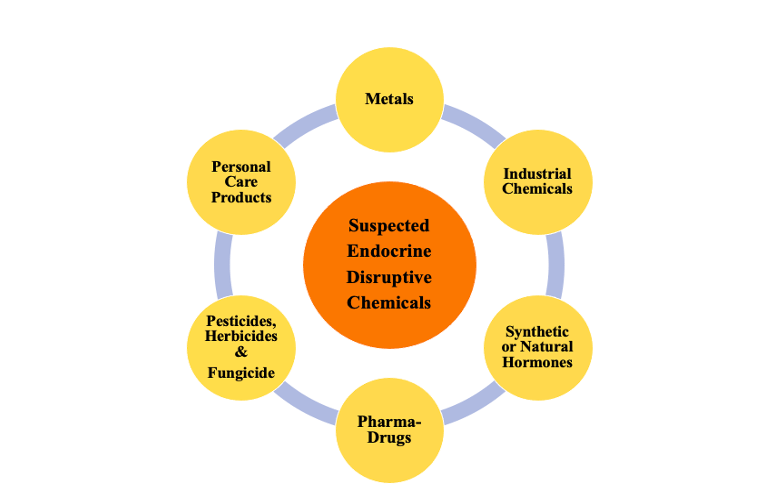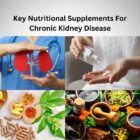Endocrine Disrupters Why So Harmful
What is an endocrine disruptor?
Many chemicals in body either man-made or natural can disrupt endocrine system. The endocrine disruptors can impact the cognitive, reproductive, immune system as well as development of an individual. They are found in many products which are used in day-to-day life, likewise plastic bottles, containers, metal liners, toys, cosmetics, detergents, food and pesticides, etc. They are acting like hormone (estrogen) which can turn on estrogen dominance.
What are the common endocrine disruptors which you use daily?
- Bisphenol A: Used to make plastic, food containers and much more major cause of birth defects.
- Glyphosate: Herbicide used which is strictly cytotoxic and exhibits estrogenic and carcinogenic property used for non-organic crops. This chemical contributes to infertility, obesity, birth defects and Alzheimer’s disease.
- Dioxins: By-product of paper bleaching, released recklessly in the environment. Can cause infertility, nervous system disorders, cancer.
- Parabens: These chemicals are criminally found in so many personal products. They contain xenoestrogen which is a potential cause of breast cancer.
- Artificial Fragrance: Most perfumes are made of petroleum which contains many harmful contents and are potential carriers of cancer, nervous system disorders, allergies and birth defects.
- Perchlorate: This can be found in drinking water or fireworks.
- Perfluorochemicals: Textiles, Clothing, Non-Stick Food Wrappers, Microwave Popcorn Bags, Old Teflon Cookware.
- Phthalates: This is found in cosmetics beauty products, plastics and is responsible for male fertility and reproductive birth defects, hyperthyroidism.
- Triclosan: Found in liquid body-wash and antibacterial products.
There are so many products which we use in day-to-day life which are responsible for the triggering of endocrine and hormonal disruptors. Either a plastic bottle or a food container or cosmetics or toys.
What are the adverse impacts of endocrine disruptors?
- Complete neurological and behavioural changes.
- Reduced ability to handle stress or anxiety.
- It can lead to obesity or type 2 diabetes.
- It can adversely impact reproductive organs by blocking sex hormones in male and female
- Weakened immunity system or gut health.
- It can cause breast and prostate cancer growth
The worst part is the little awareness about these endocrine disruptors. We know very less about the chemicals and where exactly these chemicals can be found. There are endocrine disruptors in various products which we use in everyday life, leading to damaged health system.
What are the ways by which we can reduce the endocrine disruptors from our life?
- Completely avoid plastic products including plastic bottles, shopping bags, food containers, etc. Instead start using glass containers to store food, jute bags, stainless steel cups and tumblers in the place of plastics.
- Invest in organic vegetables and fruits instead of pesticides ones.
- Look for phthalate-free beauty products and avoid plastic children’s toys.
- Reduce or stop using non-stick pans.
- Use PVC-free (non-plastic) shower curtains, flooring, raincoats and rain-boots or any other related products.
- Avoid fragrances and choose cosmetics labelled as “no synthetic fragrance”, “scented only with essential oils”.
- Use labeled “microwave safe” glass or ceramic dishes while heating food in a microwave though microwaving destroy the nutritional content of the food.
There are multiple ways through which one can slowly and steadily reduce the usage of products which are potentially responsible for endocrine disruptions.
What must be avoided in food to prevent from endocrine disruptors?
- Meat (mostly non-organic meat) and certain types of fishes
- Cheese and other dairy products can also have potential endocrine disruptors
- Processed foods or canned foods
- Fruit and vegetables grown using chemical pesticides (non-organic produce)










Face Mapping: Your Face is a Mirror of Your Health - Wellness By Rosh | Integrative Wellness
3-Jan-22[…] Environmental Toxins […]
How to manage Irritable Bowel Syndrome (IBS) naturally. - Wellness By Rosh | Integrative Wellness
23-Apr-22[…] Environmental toxins such as some medications, certain food, polluted air, water and soil can enter the body through ingestion or inhalation and impair the body’s normal functioning including bowel movement. An excess amount of several heavy metals like mercury, arsenic, cadmium and chromium can lead to toxicity. […]